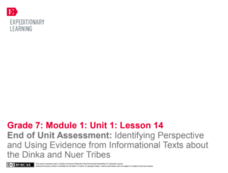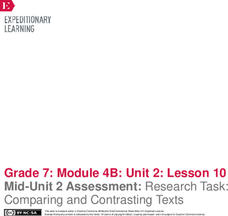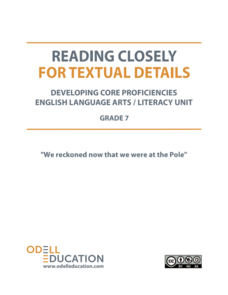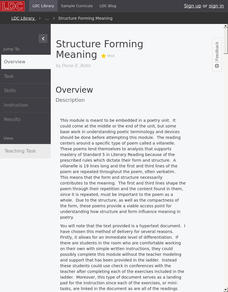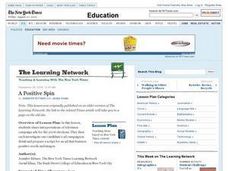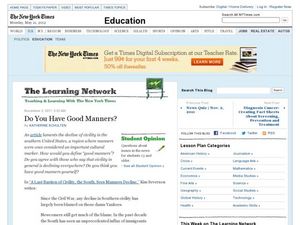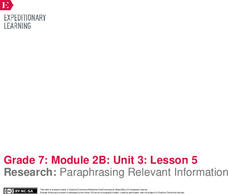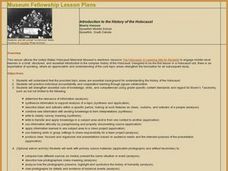EngageNY
End of Unit Assessment: Identifying Perspective and Using Evidence from Informational Texts about the Dinka and Nuer Tribes
Pupils consider the varying perspectives of people in different cultural groups as they read an informational text about the Dinka tribe of Southern Sudan and complete graphic organizers. They also respond to a constructed-response...
Fluence Learning
Writing Informative Text: Did Shakespeare Write Shakespeare?
William Shakespeare penned some of the richest and most fascinating works of literature—or did he? Middle schoolers read three brief informative passages and conduct additional research to evaluate the claim that Shakespeare did not...
National Math + Science Initative
Reading an Informational Text: "It All Started with Sputnik"
Sputnik was one of the greatest scientific advancements of the 1950s, and this reading lesson does it justice. Pupils start off with pre-reading questions and a video. They then read an excerpt from an article, which is accompanied by...
Curated OER
Using Details from Text to Identify Author's Purpose
Explore writing techniques by analyzing newspapers and magazines with middle schoolers. They will collaborate in small groups to read local news stories and identify the main ideas and author's intent. They also utilize an information...
Curated OER
Information Shuffle
Gather some information, print it onto sentence strips, and then have your class physically shuffle the cards to better understand the importance of organizational patterns in writing. Middle school learners examine information for a...
EngageNY
Finding Relevant Information and Asking Research Questions: The Benefits of Video Games
Video games may not be so bad after all. As scholars read the text "The Many Benefits, for Kids, of Playing Video Games," they summarize the gist in their researchers' notebooks. Next, pupils draft supporting research questions based on...
Curated OER
Writing Summaries
Practice summary writing with informational texts. Young readers create summaries after reading magazine articles, newspaper articles, or other forms of informational texts. Readers use the GRASP strategy (read text, write what you...
EngageNY
Mid-Unit 2 Assessment: Research Task: Comparing and Contrasting Texts
It's the half-way mark! Pupils demonstrate understanding of unit standards by completing a mid-unit assessment. After reading an informational article about water management strategies, scholars complete a graphic organizer to identify...
EngageNY
Gathering Information about Water Management: Assessing and Reading Internet Sources, Day 3
Water is life! Using the informative resource, scholars first read two informational articles about water management in agriculture. Then, they use a Venn diagram to contrast the different types of evidence authors use to support a...
EngageNY
Finding Relevant Information and Asking Research Questions: The Big Thirst
Let's get to the gist. As scholars continue their study of Charles Fishman's The Big Thirst, they practice writing the gist of the text. Additionally, pupils add notes about the industrial uses of water to their researcher's notebooks.
Odell Education
Reading Closely for Textual Details: Grade 7
Enhance the reading experience with a set of lessons designed to improve textual analysis. Seventh graders use guiding questions to read both informational text and literature closely in the first part of the unit. Next, they work on...
Literacy Design Collaborative
Structure Forming Meaning
Teach literary lovers how to form opinions about form. Scholars read
informational text about the form used in villanelles. After analyzing
the structure used in the poetry with graphic organizers and gallery
walks, writers create...
Curated OER
How Often Do You Interact with People of Another Race or Ethnicity?
Is interacting with people from different backgrounds part of a well-rounded education? A big question awaits young readers as they explore two New York Times articles that discuss modern-day segregation, population statistics, and...
Curated OER
A Positive Spin
Study word choice and connotation in advertising. Readers examine campaign ads, both negative and positive, from the 2006 mid-term election before discussing an article and analyze a campaign of any candidate they choose. Finally, they...
Curated OER
Cause and Effect Relationships - Silence of the Bees
Why are bees disappearing? Explore cause and effect relationships with this interesting question. As the detailed lesson plan indicates, start by brainstorming some of the possible effects the disappearance of bees would have on the...
EngageNY
Mid-Unit 3 Assessment and Independent Reading Check
It's time for scholars to be on their own. Individuals work independently reviewing sources to answer their research questions. Learners read "Are Your Clothes Made in Sweatshops?" to help complete the mid-unit assessment. After...
Curated OER
The Purpose and Power of Persuasion
Examine the power of persuasion and have learners consider how it influences events in their own lives. After reading and analyzing informational texts to understand the author's purpose, class members take a written test and craft a...
Curated OER
Do You Have Good Manners?
Who cares about manners anyway? According to the New York Times, Mrs. Mason does. Learners read and consider an article which addresses the decline of manners and the impact it has on society. They answer seven critical thinking...
EngageNY
Research: Paraphrasing Relevant Information
Young writers practice paraphrasing information from Truth in Advertising? They keep an eye out for examples of false advertising as they read, recording ideas and information in their researcher's notebook along the way.
Curated OER
Hic-Hic-Hooray!
What is really the best way to get rid of hiccups? Investigate some old wives' tales and folk remedies related to health. Middle schoolers explore the science behind why people might believe these myths to be true and find the real...
Curated OER
Unit 3: Scientific Writing
Write-on! Demonstrate a writing model and support learners as they write an informational essay on a water resource issue of your (or their) choosing. The lesson plan provides a well-scaffolded summative writing experience that wraps up...
Curriculum Corner
7th Grade ELA Common Core Checklists
Track your class's progress on all of the ELA Common Core standards with these handy charts. Along the left side, each seventh grade identifier is listed along with the full text of the standard. As you teach, reteach, assess, and...
Curated OER
The Learning Network: Poetry Pairing July, 21, 2011
Although not a complete lesson plan, this set of emotionally powerful texts could be used in a variety of lessons. From The New York Times' Learning Network site, the resource includes a poem, an excerpt from a New York Times article and...
Curated OER
Introduction to the History of the Holocaust
The Holocaust is unbelievable! Examine this piece of history with your class. Using the Internet, research groups determine the relevance of information presented, compare how different sites present the same information, synthesize...


